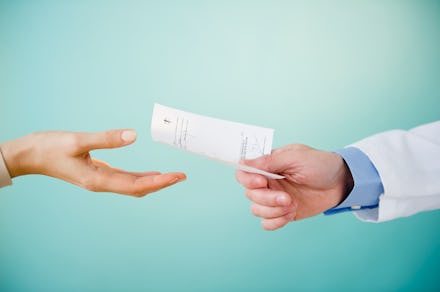Doctors should start prescribing masturbation

As someone who deals with an anxiety disorder, I’m always trying to find ways to even my mood. I’ve resorted to both scientific and err, not so scientific methods — such as CBD tinctures, aromatherapy, and regrettably, even alcohol to calm myself down at times of great stress. As someone who has seen my share of psychiatrists for my anxiety and stress issues, I’ve been encouraged to take up running and prescribed a number of meds that varied in effectiveness. But, other than normal exercise (and medicine) there’s one reliable, free way to de-stress that not one doctor in my life has ever brought up: masturbation. As science catches up to its value when it comes to alleviating stress, why aren’t doctors telling us to masturbate more?
“Most doctors think that most people do masturbate, so the need to tell them is a moot point,” Kim Langdon, an Ohio-based OB/GYN and medical advisor at Medzino, an online medical company. Her assessment is a fair one. In fact, a 2018 survey by sex toy brand TENGA found that 92% of men in America and 76% of women have masturbated at least once in a while. But while most of these people are masturbating because it feels good, obviously, a lot of them might not think of the, err, practice at times when they’re wound-up or anxious, rather than horny. Maybe instead of a nap, or when you’re stressed at work, even.
Research has been touting the benefits of masturbation for a little while now. It’s been found to reduce stress, as I mentioned; it may alleviate some symptoms of depression; and to note the obvious: orgasms feel good as hell. The scientific reason for that is that a successful self-love sesh releases dopamine and oxytocin which activates the reward center in your brain and elevates your mood. There’s a positive physical component too: for people with vaginas, it can alleviate the pain of menstrual cramps and increase sexual desire and sensitivity.
People with vaginas have medical issues which can benefit from masturbation as well. Those who experience pain with intercourse can use increasingly larger vibrators and dildos to gradually stretch the pelvic muscles for less pain with penetration. Masturbation can also help those with orgasmic disorders. “For instance, if a woman can climax when she's alone but not with a partner, she has physical potential for orgasm but that likely means she needs a sex therapist,” says Karyn Eilber, associate professor of urology, obstetrics and gynecology at Cedars-Sinai Medical Center.
And in penis-havers, orgasms have been linked to a lowered risk of prostate cancer. They stimulate new sperm production (which may help someone clear those cobwebs when trying to have a kid). ”Men who might benefit from masturbation include those with recurrent prostatitis, which is a swelling of the prostate gland either due to inflammation or infection, because ejaculation helps remove the prostate fluid that accumulates there,” adds Eilber. She also says that those with premature ejaculation issues also benefit from self-pleasure; by masturbating just to the point of climax then stopping, they can actually condition themselves to last longer.
So basically, for so many of us, jerking off is a veritable CVS-worth of treatment. While I’m calling for doctors to literally prescribe masturbation when someone shows signs of stress, though, the experts I spoke to for this piece seem to actually think it’s already a pretty routine part of people’s daily lives, more so than regular exercise and eating healthy.
I’m not sold — I somehow don’t think most people masturbate enough. I certainly don’t think I do. Part of this is due to the natural moods of my body, but part of this might have something to do with stigma as well.
Ah, sex and shame. They go together like bottomless mimosas and hangovers. Growing up in a religious Roman Catholic household, and going to a private school, I was introduced to the topic of sex as a means of procreation only, and masturbation as a mortal sin, two things I vehemently disagree with now. But, as with all things taught in your formative years, it’s hard to shake. You don’t even need to be religious in order to be familiar with masturbation myths, either. Though debunked, these include infertility (of which the opposite is apparently true), blindness, and something called “hairy palms.” (If that last one were true we would probably be seeing Gillette for Hands™ commercials.) These ridiculous falsehoods are pervasive and prevent a lot of us from fully embracing the concept of self-love.
“I have said [to some of my patients] that there are all sorts of ways to have an orgasm if it’s not working out for you the old-fashioned way,” Langdon says, showing that another myth, that masturbation is only for people not in relationships, is still prevalent. “In fact, many women claim they cannot orgasm with penile penetration, so masturbation is the perfect foreplay and answer to their problem.”
Langdon and Eilber add that suggesting masturbation to patients would not violate any rules or codes of ethics, but that some doctors may err on the side of caution in telling someone to masturbate unless there’s a direct medical benefit. While the stigma that surrounds masturbation sucks, I do get that not everyone is comfortable talking about sex with their doctors because of past trauma or the like. And the conversation shouldn't be forced on anyone for that reason. “If the question of masturbation is raised, then reassuring the patient and telling them the health benefits of masturbation makes sense,” Langdon says, noting that this is probably easier for urologists and OB/GYNs to do because of the organs and conditions that they treat.
As somebody who never would have mentioned masturbation, it clearly could have served me well in my decades-long battle with anxiety. This makes the subject of masturbation and its benefits the elephant in the room, and it really shouldn’t be.